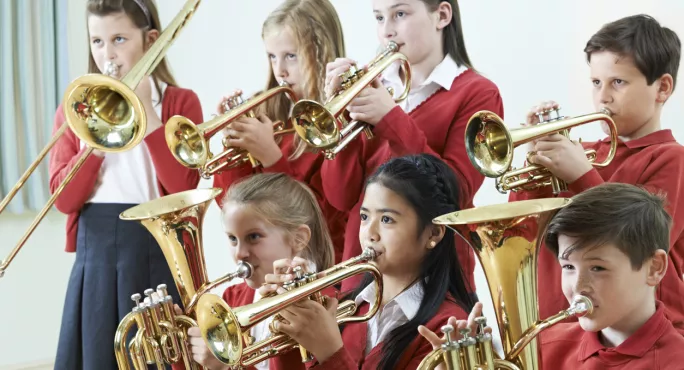
- Home
- Losing extracurricular music will increase disadvantage
Losing extracurricular music will increase disadvantage

What will schools lose as choirs and ensembles with brass and wind instruments are banned, reduced, or removed?
The practicalities of the government’s current guidance on fully reopening schools from September could mean that the power of music and other extracurricular activities cannot be fully harnessed.
Clearly, singing and playing brass or wind instruments will not be possible with groups of more than 15 students for the foreseeable future. And it may be impossible to run certain musical groups - such as wind bands - because they require these newly prohibited instruments
But could the impact be even greater than this? Might staggered start and finish times for the school day, the continuing need for social distancing (which may further reduce the maximum ensemble size of 15), and the existence of year-group bubbles lead to the demise of schools’ extracurricular arts programmes?
If this were to happen - at least for the foreseeable future - schools could lose far more than the noise emanating from the music department.
A metaphorical shop window
There is no avoiding the fact that music happens in groups. Music departments are usually community hubs within our schools, where many students of different backgrounds and interests meet and engage with each other and with music: they come together to share in something special.
This rich socialisation experience is usually promoted as one of the reasons for supporting an active extracurricular programme. In the Covid-19 era, however, this very same factor may be used by some to advocate against musical groups and activities continuing in September.
However, extracurricular activities form a part of a school’s metaphorical shop window. The music and groups presented to the outside world says something about a school’s ethos, culture, and community. Completely losing these groups could damage a school’s sense of collective community.
Developing a musical identity
Everyone has a musical identity, defined by anything from basic preferences, such as favourite bands or songs, to more traditional concepts of a musical identity, such as being a proficient performer or instrumentalist.
In other words, the music we experience and engage with forms a part of who we are as individuals.
Students in the arts frequently express parts of their individuality through performance, composition, and passionate debates. The arts, therefore, provide students with a safe space to express and explore their creative identities, through a medium that remains highly personal to every student.
While curriculum music education will continue for the majority of students from September, it is often through extracurricular clubs, groups, and ensembles - and their less formal, more negotiable nature - that students find a sense of purpose and individuality.
Without some kind of creative extracurricular provision, schools risk stifling their students’ self-expression, creativity, and individualism.
Cultural capital
Many students have thrived musically during the period of school closures. Some students who stopped playing their instruments at the end of Year 6 have subsequently picked them up in Year 12 during lockdown. Others have embarked on online musical journeys as they share their talents with the world via streaming services.
Others immediately lost all access to the arts as soon as schools were ordered to close their doors.
It is those students who don’t have access to instruments, technology, or artistic role models at home who will be fundamentally disadvantaged by a lack of choirs and ensembles in our schools.
Also vulnerable to losing access to the arts are those students who don’t study arts subjects at GCSE or A level, but pursue extracurricular activities. Schools with a two-year key stage 3 are particularly at risk of excluding the majority of their students from engagement with the arts from September.
Schools may inadvertently exacerbate disadvantage if choirs and ensembles disappear entirely.
A stress-relieving experience
The positive link between singing and wellbeing is well-researched and heavily documented. Arts participation more generally helps to overcome anxiety, depression, and stress.
Arts extracurricular activities provide students with a sense of purpose, inspiration and, in many cases, a stress-relieving experience.
What is so powerful about music is that it is non-verbal: students can express themselves through a medium that does not require verbal conversation. They simply create or perform sound in a way which is meaningful to them. For many students, including those with English as an additional language and those with emotional, physical, and social difficulties, choirs and ensembles are empowering ventures.
Blended extracurricular activities
It is clear that school choirs and ensembles will look different from September. This does not mean that we should give up on them.
Teachers are creative people, who will find ways to continue these groups. Technology may well play an increasingly important role in our extracurricular provisions, but we must not forget that we could physically cater for up to 15 socially distanced members in physical choirs and ensembles.
With “blended learning” becoming a new buzz phrase, blended extracurricular activities could well be part of the new-look school term.
Whatever we do, we must endeavour to continue our choirs and ensembles in some form. If we don’t, schools risk losing an important part of their community and identity. And students may lose inclusive access to the arts, which would damage their wellbeing, individuality, and creativity.
Callum Bates is a newly qualified music teacher in the East of England
Register with Tes and you can read five free articles every month, plus you'll have access to our range of award-winning newsletters.
Keep reading for just £4.90 per month
You've reached your limit of free articles this month. Subscribe for £4.90 per month for three months and get:
- Unlimited access to all Tes magazine content
- Exclusive subscriber-only stories
- Award-winning email newsletters
You've reached your limit of free articles this month. Subscribe for £4.90 per month for three months and get:
- Unlimited access to all Tes magazine content
- Exclusive subscriber-only stories
- Award-winning email newsletters


